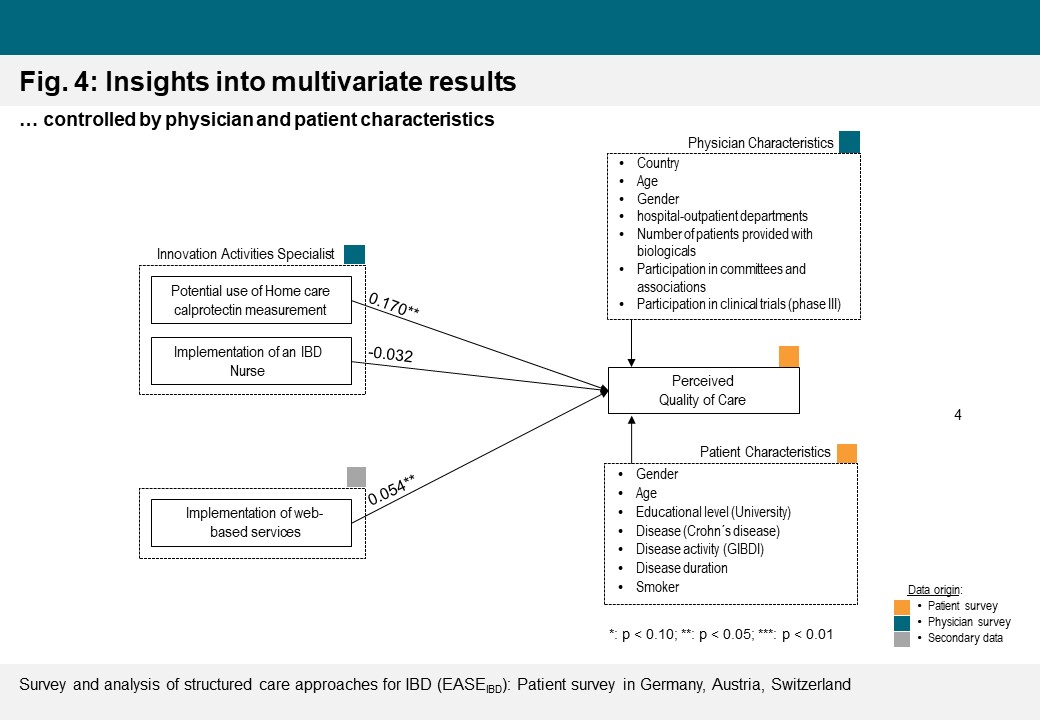P279 Potential of managed care programmes for patients with inflammatory bowel diseases – results from a large survey study among physicians and IBD-patients in Germany, Austria and Switzerland (the EASEIBD study)
Bokemeyer, B.(1);Kaiser, C.(2);Primas, C.(3);Novacek, G.(3);Biedermann, L.(4);Seibold, F.(5);Tappe, U.(6);Bettenworth, D.(7);Graw, J.(2);Hartmann, P.(8);Plachta-Danielzik, S.(9);Schultz, C.(2);
(1)Interdisziplinäres Crohn Colitis Center Minden und Medizinische Klinik I- Universitätsklinik Schleswig-Holstein- Campus Kiel, Gastroenterologische Praxis Minden, Minden, Germany;(2)Institut für Innovationsforschung, Lehrstuhl für Technologiemanagement- Christian-Albrechts-Universität zu Kiel, Kiel, Germany;(3)Medizinische Universitätsklinik Wien, Universitätsklinik für Innere Medizin III, Vienna, Austria;(4)Universitätsspital Zürich, Klinik für Gastroenterologie und Hepatologie, Zürich, Switzerland;(5)Gastroenterologische Praxis, Crohn-Colitis-Zentrum, Bern, Switzerland;(6)Gastroenterologische Gemeinschaftspraxis, Innere Medizin II- St. Barbara-Klinik Hamm, Hamm, Germany;(7)Praxis für Innere Medizin Münster, CED-Schwerpunktpraxis, Münster, Germany;(8)Gastroenterologische Gemeinschaftspraxis Minden, Fachgesellschaft für Asssitenzpersonal CED - FA-CED, Minden, Germany;(9)Kompetenznetz Darmerkrankungen, Studienabteilung, Kiel, Germany
Background
IBD-care may be challenging and benefits from a multidisciplinary, cross-sectoral treatment approach and active patient involvement. However, occasionally there is a lack of patients´ empowerment and additionally, a necessity for the optimisation of physicians´ treatment is apparent. Furthermore, there is a deficiency in evidence regarding the effectiveness of structured care approaches ("managed care") on patient-related outcomes (PROs). Therefore, our study aims to evaluate the potential of managed care programmes for IBD patients.
Methods
EASEIBD is a cross-border study conducted by IBD-DACH, an IBD working group in Germany (D), Austria (A) and Switzerland (Ch). Within the DACH-region, a cross-sectional survey of patients and physicians from IBD hospital-outpatient departments and gastroenterology practices was carried out. The questionnaire evaluated the effect of instruments and contextual factors of IBD-care with regard to quality of life (QoL). Additionally, the effects of "managed care" instruments were examined while considering centre-related structural characteristics. The analysis was performed using a multivariate multilevel regression model, controlled by various physician and patient characteristics.
Results
2536 IBD-patients from 66 centres (643 IBD-patients/quarter; 31% hospital out-patient departments) were consecutively enrolled in EASEIBD (centres/IBD-pat.: D-52/1735; A-10/647; Ch-4/154). Overall, patient satisfaction (77-84%) (Fig. 1) as well as perceived quality of care (82-87%) (Fig. 2) was high and comparable in the descriptive analysis between German, Austrian and Swiss IBD-patients. Statistically significant differences were only found in single characteristics, e.g. in quality of life (EQ5D-VAS) (p=0.004) (Fig. 3). However, these do not appear clinically relevant with regard to the absolute values. In the entire DACH-region there were detectable effects of elements representing structural quality and assessments of the centres, with regard to the perceived quality of patient care (Fig. 4), whereby, in particular, a positive influence of web-based instruments (e.g. homepage) (p=0.040) and potential use of homecare calprotectin (0.046) had the most pronounced effect. Noteworthy, in Germany, the implementation of specialised IBD nurses was associated with a beneficial impact on patients´ QoL (0.027) when compared to the cumulative results from the entire DACH region (p=0.681).



Conclusion
Our study shows that the use of elements of managed care programmes resulted in a high process quality, which is evident from the reported high patient satisfaction and quality of care by IBD-patients in the entire DACH region, and qualifies this area as a suitable common study landscape.


